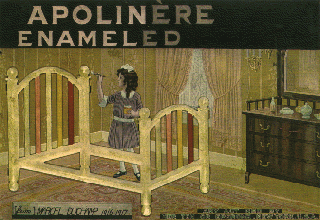Voila, the Locus Solus Industries cafépress store. Go buy things. Or rather, go buy the one thing that’s there, this fine t-shirt:

Suitable, I am sure, for many occasions.
Voila, the Locus Solus Industries cafépress store. Go buy things. Or rather, go buy the one thing that’s there, this fine t-shirt:

Suitable, I am sure, for many occasions.
(also)

Marcel Duchamp’s Apolinère Enameled, 1916–1917
Rhonda Roland Sherer’s “Marcel Duchamp’s Impossible Bed and Other ‘Not’ Readymade Objects: A Possible Route of Influence From Art To Science”
With the end you are tired of this old world Shepherdess ô Eiffel Tower the herd of the bridges bleats this morning You have enough of it to live in Greek and Roman antiquity Here even the cars seem to be old The religion alone remained very new the religion Remained simple like the hangars of Port-Aviation Only in Europe you are not ancient ô Christianisme European most modern it is you Black and white Pape X And you that the windows observe shame retains you To enter daN a church and of you to confess this morning to it You read the leaflets the catalogues the posters which sing high Here is poetry this morning and for prose there are the newspapers There are the deliveries with 25 centimes full with adventure police Portraits of the great men and thousand titles various I saw this morning a pretty street of which I forgot the name New and clean of the sun it was the bugle Directors workmen and beautiful shorthand typists Monday morning at Saturday evening four times per day pass there The morning by three times the siren groans there A rageuse bell barks there about midday Inscriptions of the signs and the walls The plates the opinions the made-to-order of the parrots criaillent I like the grace of this industrial street Located in Paris enters the street Aumont-Thieville and the avenue of the Terns
(Google translation of the start of Guillaume Apollinaire’s “Zone”, from here, complete in French here, and an anonymous translation – not that of LeRoy C. Breunig, Donald Revell, or Samuel Beckett –into English here.)
(Perhaps related: bpNichol’s Translating Translating Apollinaire.)
A quick post on if:book on why blogs are terrible things.
Rest in peace, Nam June Paik.
“In La Musica Ideal (known in the English-speaking world as ‘The Musicians,’ not a translation but, then, the titles were not always given by Caravaggio), what is the young man at the left doing? Why isn’t he playing an instrument? Does he provide the musicians with an audience?”
(Dick Higgins, “The Importance of Caravaggio”, in Modernism Since Postmodernism: essays on intermedia, p.152)
There’s a nice post at The Valve which nicely gets at how deeply weird Proust gets w/r/t jealousy towards the end of the book.
And a nice post at pas au-delà on the connotations of punctuation. There’s a fine discursion on this (more precisely, what it means to emphasize things in the German style, by increasing letterspace in the emphasized word) towards the end of Agamben’s The Time That Remains. And there was another one recently about dashes – where was that?
More precisely, a bad reproduction of it:
There’s a much better reproduction of this in the print edition of this NY Times review of the show at the Cartier-Bresson Foundation, but it’s not on the web. I like this one because it looks like it’s been through too many Photoshop filters.
This part of the Times article is misleading at best:
What Pound felt is impossible to know. Years earlier, he had been interned for mental illness, and in 1960, he lapsed into long periods of depressive silence and stopped writing. And yet, in the image selected by Cartier-Bresson, Pound’s wild hair, burning eyes and tense hands seem to speak volumes about an old man raging against the dying of the light.